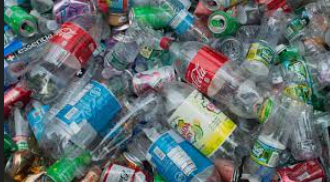Plastics: A Major Harm to The World

June 11, 2023
Imagine this: Animals eating whatever they see on a beach littered with plastic. Some are choking and getting hurt. More and more animals are dying as a result of ingesting plastic. Some people may think that plastics are useful, but in reality, they cause more harm than good. For instance, during the process of burning plastic, carbon dioxide is produced. This can lead to climate change, which can really damage the world. In addition, microplastics (tiny bits of plastic) go into the ocean, injuring zooplankton, which could become a big problem. All in all, using plastic is not good for the world because it can really damage our world in different ways.
Plastics are harmful because, during the process of recycling, carbon dioxide is released. Carbon dioxide is a gas that can lead to global warming or climate change (Newsela). For instance, John Terry, a science writer for The New York Times, says that “carbon dioxide, a gas, is produced during the recycling process and can lead to climate change. A ton equals 2,000 pounds is released” (Newsela). It is evident that the more we are recycling plastic, the more carbon dioxide we are sending into the atmosphere. Carbon dioxide can lead to climate change which causes Antarctic ice to melt, causing negative effects on the animals that live there and can even change what our seasons look like! In conclusion, burning plastic causes harm to the atmosphere and the animals.
Plastics are bad because microplastics are harming zooplankton, which are tiny ocean organisms. This is because zooplankton that eat microplastics are more likely to die and less likely to reproduce. This is a big problem for marine life since zooplankton are essential for the ocean’s food web (Newsela). Madeline Steer, a science writer for Newsela says, “Basically it’s not good for them, they’re going to die,” said Madeleine Steer”(Newsela). If zooplankton die, many of the big fish that we have today will not survive. It is evident that this means that if we don’t do something to protect the zooplankton, it could really damage the ocean’s food web and affect other fish populations, which in turn would. affect us in terms of fishing careers as well as food sources. All in all, people have to protect the ocean and not throw plastic or microplastic into the ocean because that could harm ocean life and also complicate things in marine life as well as have negative effects on humans.
Although recycling plastics means that there is less garbage in our landfills, overall the use of plastics is negative. Recycling plastics takes energy, leads to pollution, and is costly. In addition, recycling plastics gives people the sense that they’re doing all they need to do on behalf of the environment, when in fact recycling plastics alone isn’t enough to, say, fight climate change or eliminate pollution. Reducing the use of plastics, or at least reusing them for a longer time, is what we need to do to make a greater positive impact on our world.
In conclusion, using plastics is not worth it, since it contributes to global warming and it is harmful to zooplankton. One negative side of recycling plastic is that carbon dioxide is released into the atmosphere which causes climate change. This can be harmful because it can melt off Antarctic ice or change the course of the seasons. Another negative side of plastics is that microplastics that go into the ocean harm zooplankton. Zooplankton that eat microplastics are not able to reproduce and are also more likely to die. This negatively affects other ocean species and humans in many ways because zooplankton is the most basic species in the food web. All in all, as you can see, plastics are negative because their effects are detrimental to the future of our world. This summer, try the challenge of reducing your plastic use to do your part to preserve our planet!
Works Cited
“Ep 6: Living to Serve | SEARCH ON.” YouTube, 12 June 2018, https://newsela.com/view/ck9nooc0101ql0iqj2832g3bi/?levelId=ck7ecumoh08tf14p75vx7of3z. Accessed 1 March 2023.
“Evidence shows that microplastics are harmful to ocean zooplankton.” Newsela, 20 September 2016, https://newsela.com/read/microplastics-expedition/id/21864/. Accessed 1 March 2023.
Josephson, Amelia. “The Pros and Cons of Recycling.” SmartAsset.com, 31 March 2023,
https://smartasset.com/insights/the-pros-and-cons-of-recycling. Accessed 9 May 2023.
“What Really Happens To Your Plastic “Recycling.” Plastic Pollution Coalition, 16 May 2022, https://www.plasticpollutioncoalition.org/blog/2022/5/16/what-really-happens-to-your-plastic-recycling. Accessed 1 March 2023.




